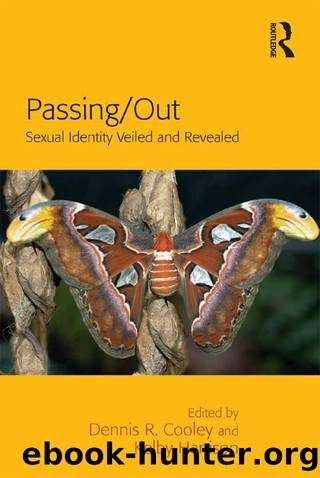PassingOut by Kelby Harrison Dennis R. Cooley

Author:Kelby Harrison, Dennis R. Cooley [Kelby Harrison, Dennis R. Cooley]
Language: eng
Format: epub
ISBN: 9781409456551
Barnesnoble:
Publisher: Ashgate Publishing Ltd
Published: 2012-08-01T00:00:00+00:00
Comments on Coverâs âIdentity and Passing Critical Essays: Queer Youth, Risk and the Passing/Coming Out Dichotomyâ
Janna Jackson Kellinger
Rob Coverâs chapter allowed me to step out of myself and my own experiences to reflect on how my own understanding of my self is shaped by the cultural narratives that surround me. He makes a strong and theoretically well-supported argument that complicates assumed binaries around passing and coming out, particularly in terms of literature about suicide, and points out that harm can accompany these false binaries. I would like to extend his arguments by supplying some examples of the âreal harm to real peopleâ1 that can happen while complicating his complications even more.
Cover deconstructs the notion that there are only two options for gay people, passing or coming out, and argues there is no clear cut âinâ or âoutâ of the closet, but rather that people negotiate their identities depending on the situation. This is a lived reality for teachers: âThere are decisions to be made on a continuous, day-to-day basisâoften several times a day. Decisions like these involve a careful scrutiny of each context. Each such decision is accompanied by a risk and a wide range of possible effectsâ (Epstein and Johnson 1994: 199). Something that often gets lost in discussions about coming out versus passing, however, is that how identity is presented, received, and circulated is not always completely within the control of the bearer of that identity. As teachers in this study point out, students talk so once a queer identity is disclosedâwhether by the bearer of that identity or by others, there is no more contextual negotiation around coming out, except, perhaps, in how a teacher responds to any reactions.
When I taught high school in Georgia, I knew more than one teacher whose identity disclosure fell into the hands of othersâone of whom was explicitly told she was being fired for being gay. Even when being outed does not lead to being fired directly, indirect means can be used to end employment, such as the special education teacher whose administrators stopped acting on any discipline referrals he sent to the office so word spread quickly that students could get away with anything in his class allowing administrators to fire him for lack of class management. Real risks and consequences accompany being out and being outed.
For students, since they do not have as much control over their lives as adults, being out carries even more risks, as Cover states: âfor younger teenagers and youth in particular circumstances or environments that push for coming out do not necessarily have a positive effect.â For example, when I was a high school teacher, a smart young woman in my class was verbally and physically assaulted by her father for being a lesbian, resulting in her moving out and subsequently dropping out of high school to work to afford her own apartmentâdrastically altering her life chances.
The digital age and the anonymity that accompanies it increases the likelihood of being outed and the ease of dissemination can make coming out and being outed much more public.
Download
This site does not store any files on its server. We only index and link to content provided by other sites. Please contact the content providers to delete copyright contents if any and email us, we'll remove relevant links or contents immediately.
| Anthropology | Archaeology |
| Philosophy | Politics & Government |
| Social Sciences | Sociology |
| Women's Studies |
Born to Run: by Christopher McDougall(7119)
The Leavers by Lisa Ko(6943)
iGen by Jean M. Twenge(5407)
Sapiens by Yuval Noah Harari(5363)
Spare by Prince Harry The Duke of Sussex(5173)
The Kite Runner by Khaled Hosseini(5162)
Machine Learning at Scale with H2O by Gregory Keys | David Whiting(4290)
Bullshit Jobs by David Graeber(4177)
Never by Ken Follett(3931)
Goodbye Paradise(3797)
Livewired by David Eagleman(3762)
Fairy Tale by Stephen King(3366)
A Dictionary of Sociology by Unknown(3070)
Harry Potter 4 - Harry Potter and The Goblet of Fire by J.K.Rowling(3057)
The Social Psychology of Inequality by Unknown(3014)
The Club by A.L. Brooks(2919)
Will by Will Smith(2904)
0041152001443424520 .pdf by Unknown(2842)
People of the Earth: An Introduction to World Prehistory by Dr. Brian Fagan & Nadia Durrani(2726)
